In today's rapidly evolving financial landscape, digital currencies are capturing the attention of investors and regulators alike. As these innovative assets gain traction, the need for effective oversight becomes increasingly crucial to ensure a secure and transparent market. Understanding the nuances of digital currency management is essential for anyone involved in this space, whether you're a seasoned investor or a curious newcomer. Dive into our article to explore practical insights and guidelines that can help navigate the complexities of digital currency oversight!
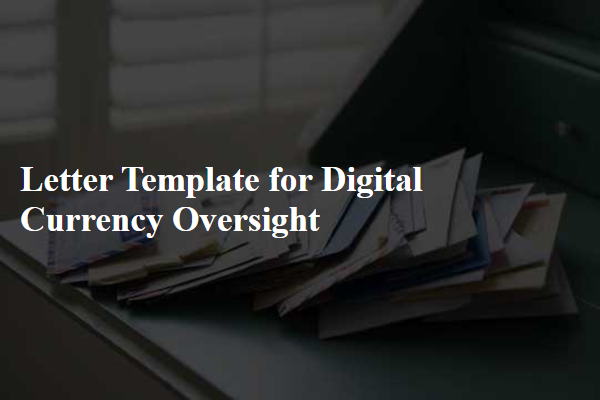
Regulatory Compliance and Framework
Digital currency oversight requires a comprehensive regulatory compliance framework to ensure stability and security in financial markets. Regulatory bodies, such as the Financial Action Task Force (FATF), emphasize adherence to Anti-Money Laundering (AML) and Counter-Terrorist Financing (CTF) regulations, particularly for cryptocurrencies like Bitcoin and Ethereum. The implementation of robust Know Your Customer (KYC) policies is essential to verify user identities and mitigate risks associated with fraud and illicit activities. Additionally, jurisdictions like the European Union are introducing the Markets in Crypto-Assets (MiCA) regulation, aiming to standardize rules for digital asset service providers. These frameworks are critical for fostering trust among investors and protecting consumers in a rapidly evolving digital landscape.
Consumer Protection Measures
Digital currency oversight requires comprehensive consumer protection measures to address potential risks associated with cryptocurrencies. Regulatory bodies, such as the Financial Stability Oversight Council (FSOC) in the United States, emphasize the need for clear guidelines and secure infrastructure for digital transactions. Ensuring transparency in trading activities helps build consumer trust within destabilized markets, impacted by significant price volatility (up to 80% fluctuations in major currencies like Bitcoin). Mandatory cryptocurrency exchanges registration could also facilitate tracking and monitoring fraudulent activities, protecting vulnerable investors. Consumer education regarding digital wallets, private keys, and potential hacking risks is essential, with initiatives launched by organizations such as the Financial Industry Regulatory Authority (FINRA). Regular audits and compliance checks would fortify the digital currency landscape, ensuring that entities adhere to established standards for user protection against scams and unexpected trading losses.
Risk Management Strategies
Digital currency oversight requires robust risk management strategies to navigate the complexities of blockchain technology and market volatility. Parameters such as market capitalization, transaction volume, and regulatory compliance play critical roles in evaluating risk. Institutions, particularly financial regulators like the Financial Stability Board, must implement monitoring systems that analyze price fluctuations, liquidity levels, and potential fraud incidents. Effective risk management frameworks should incorporate stress testing models to assess the impact of extreme market conditions, including significant downturns or regulatory changes. Additionally, the importance of cybersecurity cannot be overstated, as breaches can lead to substantial financial losses, affecting user trust and market integrity. Collectively, these strategies aim to create a secure environment for digital currency operations and ensure long-term stability in the evolving financial landscape.
Technological Infrastructure and Security
Digital currency oversight requires robust technological infrastructure and enhanced security measures to mitigate risks associated with cyber threats. Blockchain technology underpins many cryptocurrencies, ensuring decentralized and transparent transactions. However, vulnerabilities exist, highlighted by incidents such as the 2014 Mt. Gox hack, where approximately 850,000 Bitcoins were stolen, amounting to a loss of $450 million at the time. Regulatory bodies, such as the Financial Action Task Force (FATF), emphasize the importance of implementing stringent security protocols, including multi-signature wallets and cold storage solutions. Furthermore, periodic security audits and penetration testing are essential to safeguard exchanges, wallets, and payment processing systems from malicious attacks. Effective oversight mandates collaboration between government agencies, private sector entities, and cybersecurity experts to establish a resilient framework that protects digital assets and instills investor confidence.
Market Surveillance and Reporting
Digital currencies, such as Bitcoin and Ethereum, are subject to extensive market surveillance to ensure compliance with regulatory frameworks. Effective oversight mechanisms involve transaction monitoring systems capable of analyzing multiple blockchain networks and patterns in real-time. Various entities, including the Financial Action Task Force (FATF) and the U.S. Securities and Exchange Commission (SEC), have established guidelines for reporting suspicious activities that could indicate money laundering or fraud. Market participants are urged to adopt robust reporting protocols to maintain transparency and integrity within digital currency ecosystems. Ongoing advancements in artificial intelligence (AI) and machine learning facilitate deeper analysis, enhancing the identification of irregular trading behaviors. Establishing a comprehensive set of best practices is vital for fostering investor confidence and promoting a stable digital currency market.
Letter Template For Digital Currency Oversight Samples
Letter template of regulatory framework for digital currency implementation
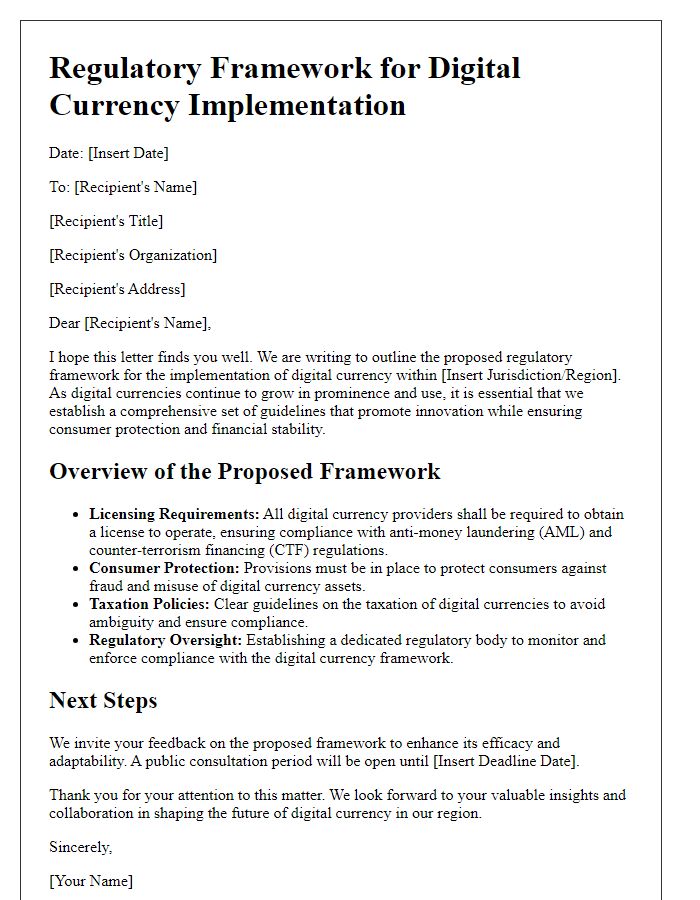
Letter template of compliance guidelines for digital currency transactions
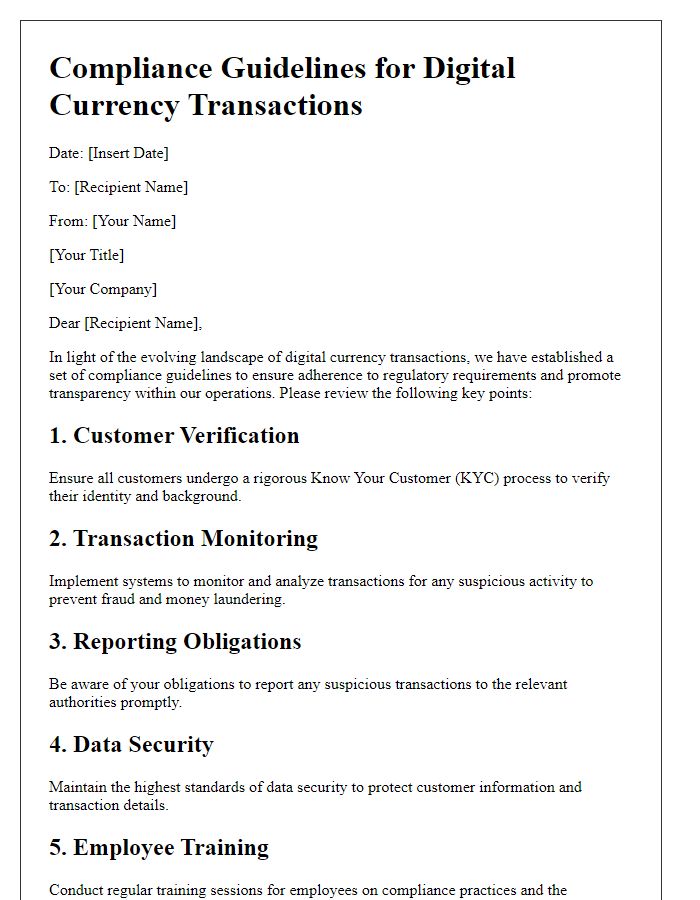
Letter template of monitoring strategies for digital currency operations

Letter template of stakeholder engagement in digital currency governance
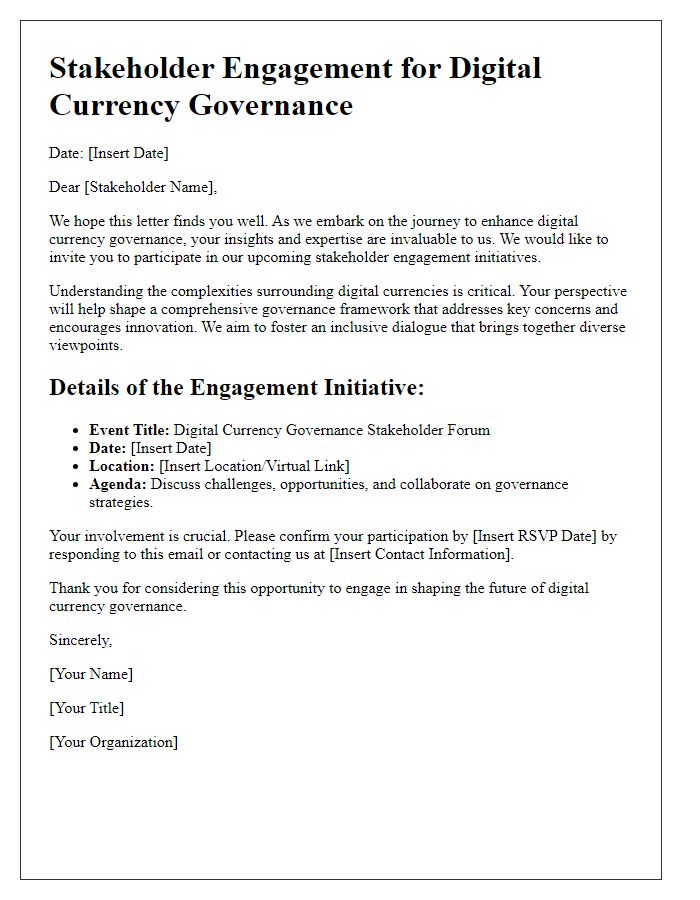
Letter template of policy recommendations for digital currency regulation
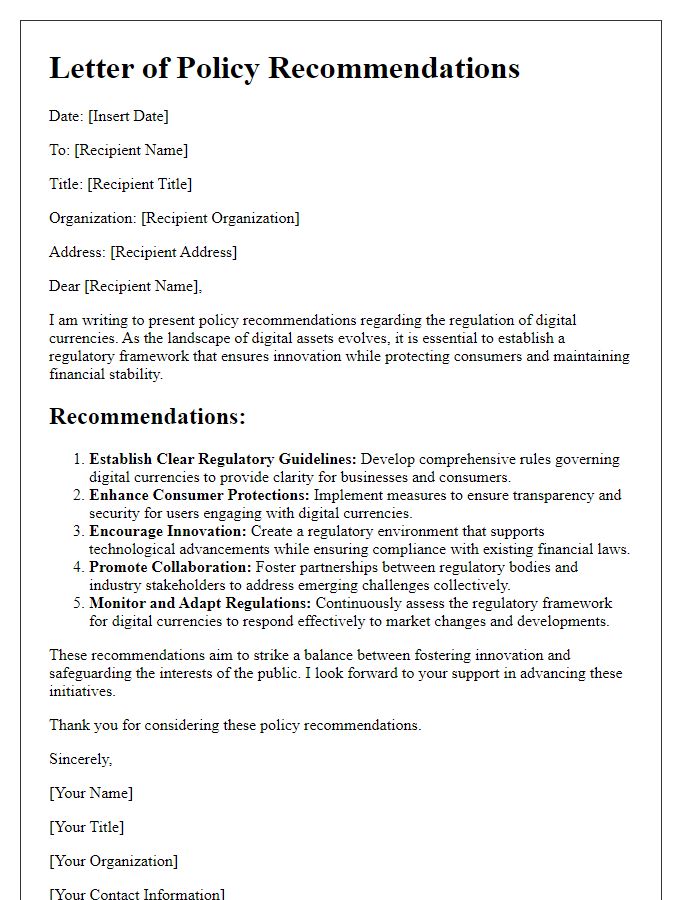

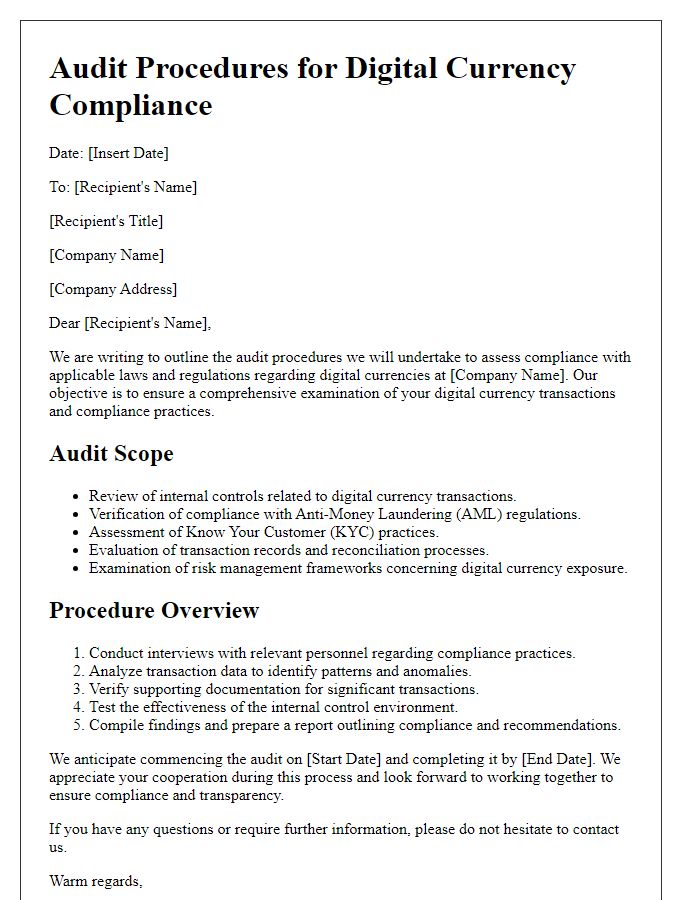
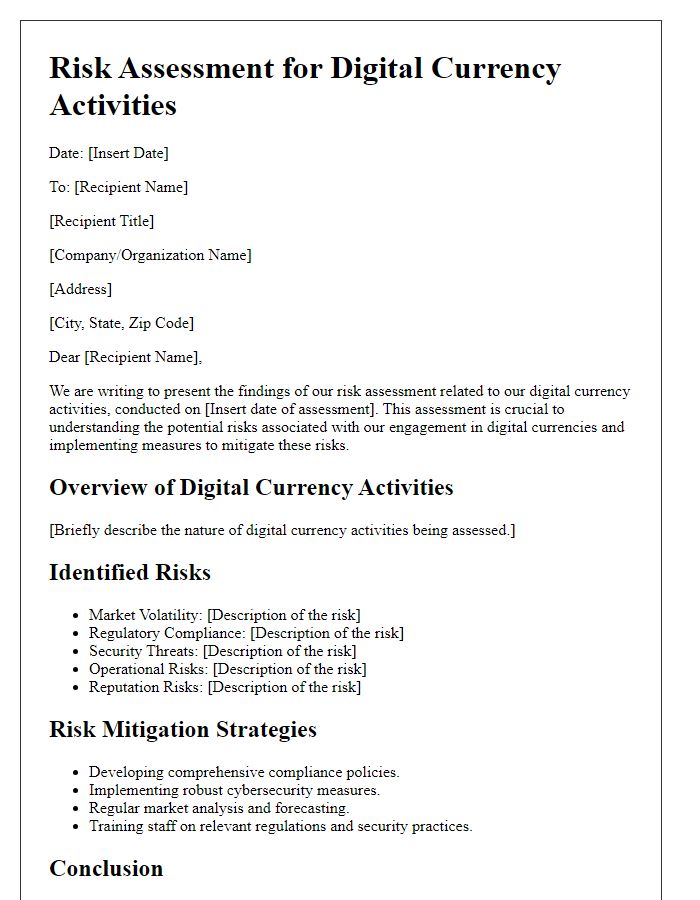
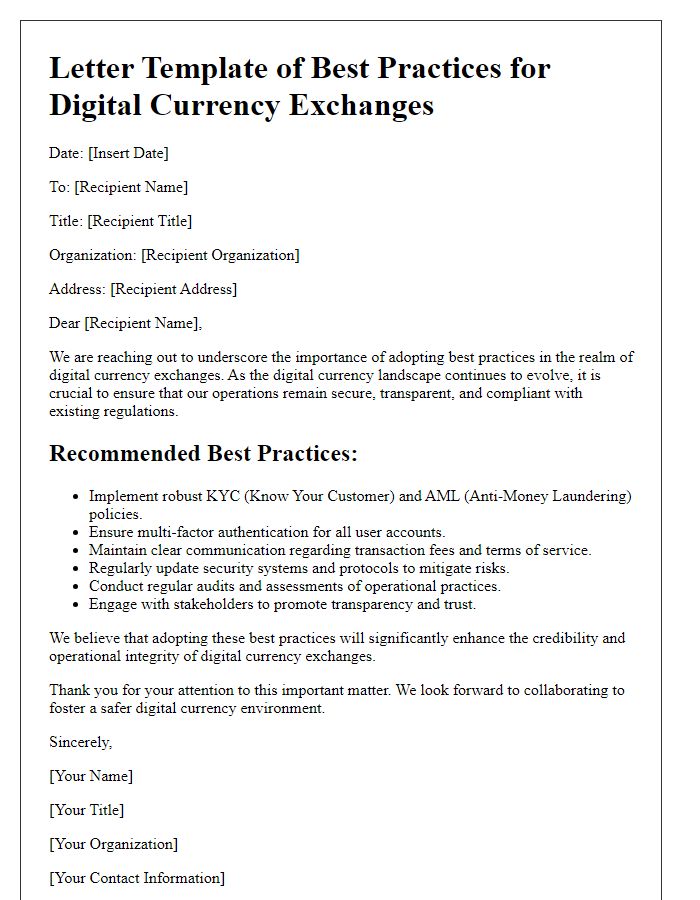
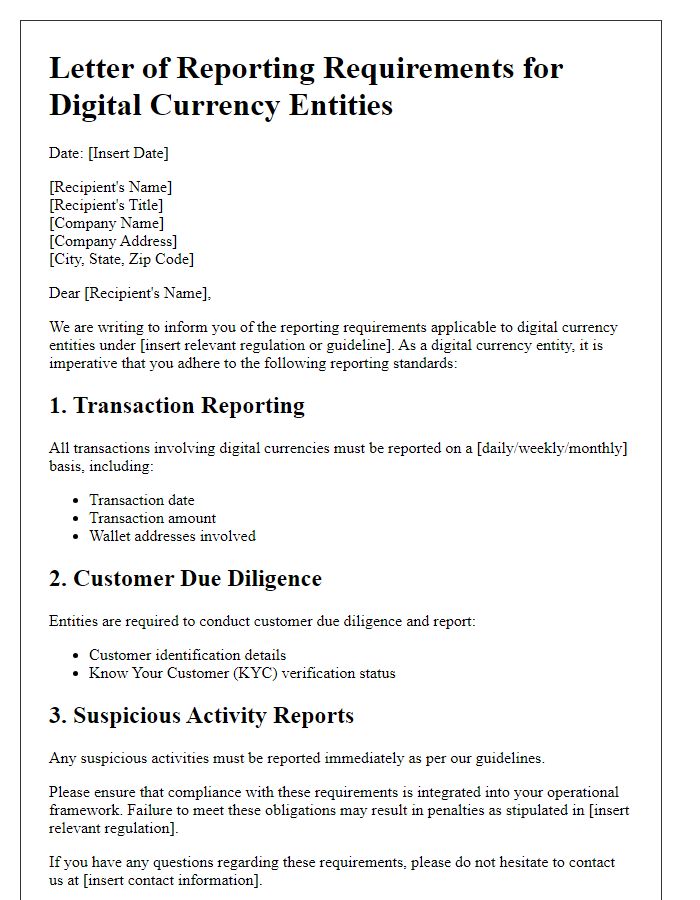
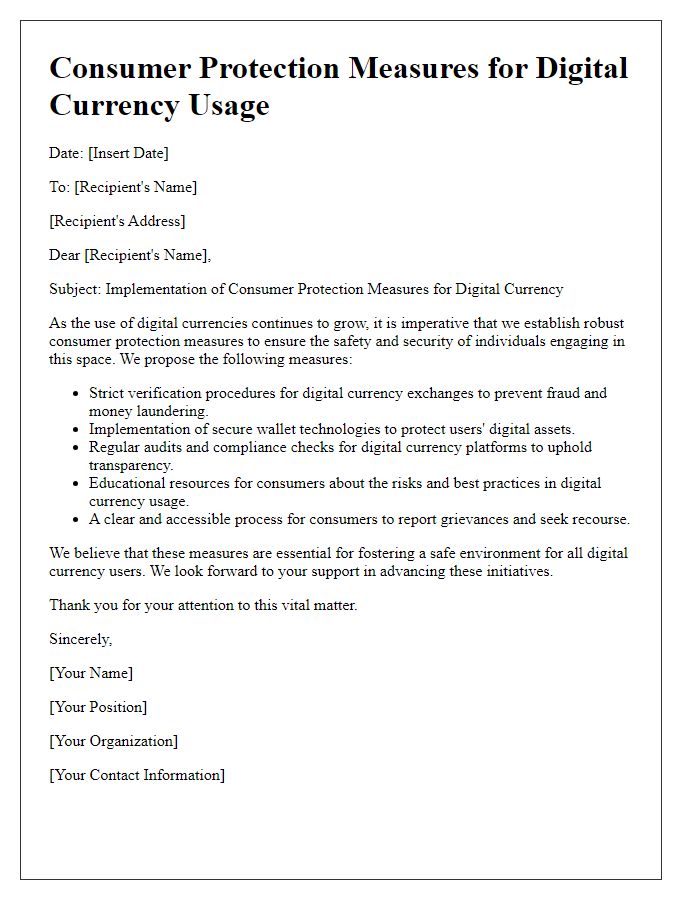

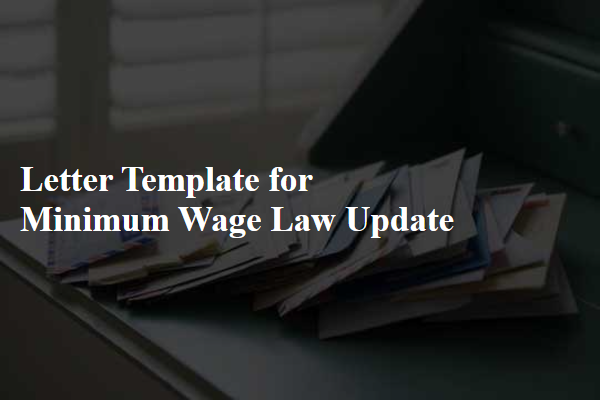
Comments